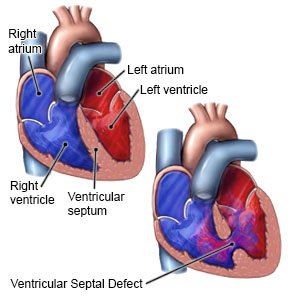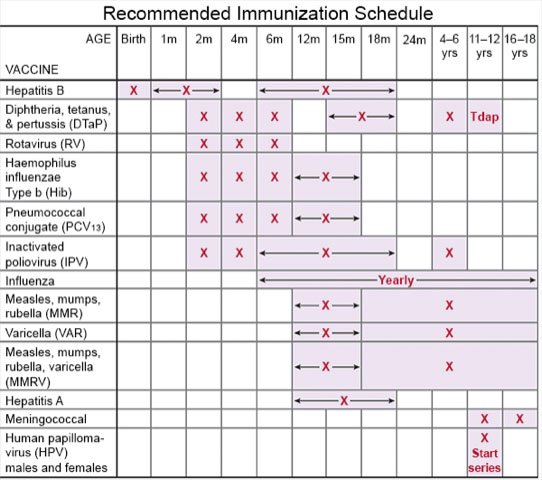Ventricular Septal Defect in Children
Medically reviewed by Drugs.com. Last updated on Aug 4, 2025.
A ventricular septal defect (VSD) is a common kind of heart defect. An opening between the 2 lower chambers (ventricles) of your child's heart stays open. Normally, this closes before a baby is born. A VSD can cause blood to flow back into the right side of the heart instead of to the rest of your child's body. A VSD can lead to heart or lung problems or to low oxygen levels in your child's blood.
 |
DISCHARGE INSTRUCTIONS:
Call your local emergency number (911 in the US) for any of the following:
- Your child has sudden trouble breathing.
- Your child has weakness or numbness in an arm, leg, or on his or her face.
Return to the emergency department if:
- Your child's lips or fingernails are blue or pale.
- Your child coughs up blood.
Call your child's doctor if:
- Your child has a fever.
- Your child has chills, a cough, or feels weak and achy.
- Your child has swelling in his or her arms or legs.
- You have questions or concerns about your child's condition or care.
Medicines:
Your child may need any of the following:
- Medicines may be needed to help your child's heart beat more strongly or more regularly.
- Diuretics help your child's body get rid of extra fluid. This medicine may make your child urinate more often than usual.
- Give your child's medicine as directed. Contact your child's healthcare provider if you think the medicine is not working as expected. Tell the provider if your child is allergic to any medicine. Keep a current list of the medicines, vitamins, and herbs your child takes. Include the amounts, and when, how, and why they are taken. Bring the list or the medicines in their containers to follow-up visits. Carry your child's medicine list with you in case of an emergency.
Care for your child:
- Let your child rest as needed. Depending on his or her symptoms, your child may need to rest more than other children his or her age. Your child's healthcare provider may also recommend limiting certain activities.
- Keep your child's teeth and gums healthy. This can help reduce the risk for an infection in his or her heart. Have your child see his or her dentist regularly.
- Do not let anyone smoke around your child. Smoke makes breathing difficult for your child. Smoke can also harm his or her lungs and heart.
- Ask about the flu and pneumonia vaccines. The flu or pneumonia can make your child's symptoms worse. Have your child get a flu vaccine every year as soon as recommended, usually in September or October. Your child's provider can tell you if he or she should get the pneumonia vaccine, and when to get it.

Follow up with your child's doctor as directed:
Write down your questions so you remember to ask them during your visits.
© Copyright Merative 2025 Information is for End User's use only and may not be sold, redistributed or otherwise used for commercial purposes.
The above information is an educational aid only. It is not intended as medical advice for individual conditions or treatments. Talk to your doctor, nurse or pharmacist before following any medical regimen to see if it is safe and effective for you.
Learn more about Ventricular Septal Defect
- Atorvastatin (Lipitor): Top 12 Drug Facts You Need to Know
- Do blood pressure drugs interact with alcohol?
- Side Effects of Weight Loss Drugs
Treatment options
Care guides
- Adult Congenital Heart Disease
- Congenital Heart Disease in Children
- Ventricular Septal Defect in Children
Medicine.com guides (external)
Further information
Always consult your healthcare provider to ensure the information displayed on this page applies to your personal circumstances.
